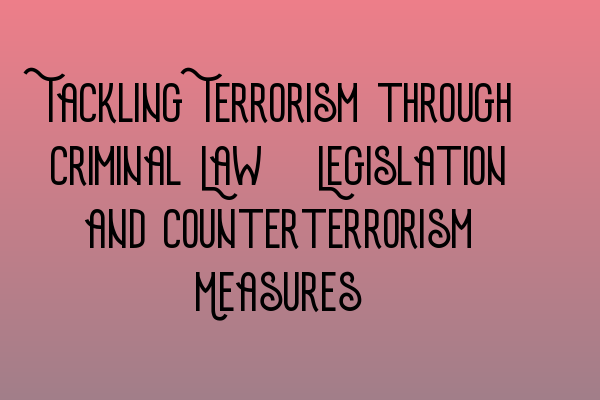Tackling Terrorism through Criminal Law: Legislation and Counterterrorism Measures
Terrorism is a global threat that continues to pose significant challenges to governments and societies around the world. In response to this threat, countries have developed various legislation and counterterrorism measures to protect their citizens and maintain national security. In this article, we will explore how criminal law is utilized to tackle terrorism, examining key legislation and highlighting effective counterterrorism measures.
The Role of Criminal Law in Tackling Terrorism
Criminal law plays a crucial role in combating terrorism. It enables states to define acts of terrorism as criminal offenses, thereby providing a legal framework to prosecute individuals involved in acts of terror. By clearly delineating what constitutes terrorism, criminal law ensures that individuals who engage in such activities are held accountable for their actions.
One of the fundamental pieces of legislation addressing terrorism in the UK is the Terrorism Act 2000. This Act gives authorities the power to arrest and detain individuals suspected of involvement in terrorism. It also outlines offenses related to acts of terrorism, such as fundraising for terrorist purposes and possessing or disseminating terrorist publications.
Effective Counterterrorism Measures
Combating terrorism requires a comprehensive and multifaceted approach. Alongside legislation, effective counterterrorism measures are crucial in preventing and responding to acts of terror. Some notable counterterrorism measures include:
- Intelligence gathering and analysis: Intelligence agencies play a vital role in identifying potential terrorist threats. Through the collection and analysis of intelligence, authorities can uncover networks, disrupt operations, and thwart terrorist attacks.
- International cooperation: Terrorism is a transnational issue that knows no boundaries. International cooperation among law enforcement agencies is essential for sharing information, coordinating efforts, and apprehending individuals involved in cross-border terrorism.
- Preventative measures: Governments have implemented various preventative measures to counter radicalization and recruitment into terrorist organizations. These measures include community outreach programs, educational initiatives, and support for individuals at risk of radicalization.
- Prosecution and legal action: Identifying, arresting, and prosecuting individuals involved in terrorism is a crucial part of the counterterrorism effort. The legal system plays a vital role in ensuring that those responsible for acts of terror are held accountable for their actions.
By employing a combination of legislation and effective counterterrorism measures, governments can enhance their ability to combat terrorism, protect their citizens, and maintain national security.
Conclusion
Tackling terrorism through criminal law is a complex and ongoing process. Legislation such as the Terrorism Act 2000 provides a legal foundation to prosecute individuals involved in acts of terror. However, effective counterterrorism measures that encompass intelligence gathering, international cooperation, and preventative measures are equally important.
If you are interested in learning more about criminal law and preparing for the SQE exams, be sure to check out our related articles:
- SQE 1 Practice Exam Questions
- SQE 1 Practice Mocks FLK1 FLK2
- SQE 2 Preparation Courses
- SQE 1 Preparation Courses
- SRA SQE Exam Dates
At SQE Criminal Law & Practice Law UK, we are dedicated to providing comprehensive resources and preparation courses for aspiring solicitors. Stay informed, ace your exams, and make a difference in the field of criminal law.
